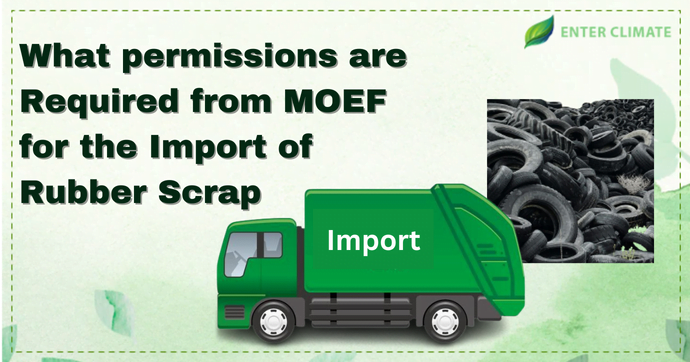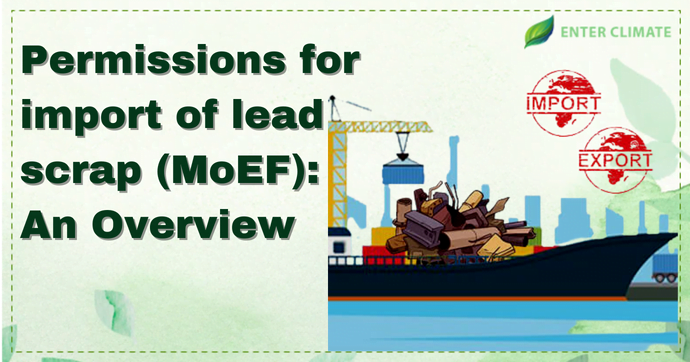All about setting up an Authorized Vehicle Scrapping Facility (AVSF/RVSF)
 21 Aug, 2023
21 Aug, 2023 
An Authorized Vehicle Scrapping Facility (AVSF) refers to a government-approved facility responsible for conducting the environmentally friendly scrapping of end-of-life vehicles (ELVs). This facility is entrusted with disposing of hazardous materials found in ELVs, such as batteries, oil, and other toxic substances, without causing harm to the environment or the health of the public. AVSFs must adhere to strict guidelines and protocols to ensure the safe and responsible disposal of these materials. They are required to obtain the RVSF/ AVSF authorization from the concerned SPCB/ PCC.
Essential Components in Starting AVSF/RVSF
The essential components in ASVf to be considered are as follows –
- Authorized scrapper: An individual, company, society, trust, or firm that owns and operates an Authorized Vehicle Scrapping Facility Authorization.
- Authorized Vehicle Scrapping Facility Authorization: Refers to an establishment that holds authorization for vehicle scrapping as issued under the guidelines for dismantling and scrapping operations.
- Deposit certificate: A certificate issued by the Authorized Vehicle Scrapping Facility Authorization (AVSF) to acknowledge the transfer of vehicle ownership from the owner to the Authorized scrapper.
- Vehicle scrapping certificate: A certificate issued by AVSF to confirm the final disposal of a vehicle. The Authorized scrapper is responsible for keeping this certificate.
- Scrapping yard: A location where the dismantled parts of the vehicle are processed for treatment.
Requirement of Authorized Vehicle Scrapping Facility
The facility must possess a sufficient area to accommodate the movement and storage of vehicles and install equipment for depolluting, reducing risks, and dismantling end-of-life vehicles. The facility must adhere to all relevant environmental regulations. In cases where an Authorized Vehicle Scrapping Facility Authorization (AVSF) lacks the capability or provisions for recycling hazardous waste such as e-waste, lead acid batteries, lithium-ion components, or recovering rare-earth metals, these materials must be sold to Authorized recycling agencies.
The following types of vehicles require Authorized scrapping:
- Vehicles that have not renewed the original certificate of registration.
- Vehicles that have not been granted a fitness certificate.
- Vehicles that have been damaged due to fire, natural disaster, riot, accident, or any calamity, and the owner has self-certified it as scrap.
- The Central or state government declared vehicles obsolete, surplus, or beyond economical repair.
- Vehicles that have outlived their utility or are no longer needed for projects such as mining, highways, etc.
- Manufacturing rejects and tests vehicles.
- Unauctioned, impounded, and abandoned vehicles that have not been claimed.
Eligibility for setting up Authorized Vehicle Scrapping Facility
To obtain authorization for the treatment of end-of-life vehicles from the respective state/UT governments, the proposed Authorized Vehicle Scrapping Facility Authorization (AVSF) must meet specific eligibility criteria. These conditions are as follows:
- The AVSF must be owned and operated by a legal entity, which can be a person, firm, society, or trust, established by applicable laws.
- The entity must possess a certificate of incorporation, valid GST registration, and a valid PAN.
- The entity should have applied for or obtained an establishment license from the relevant authority.
- The entity must fulfil the minimum technical requirements specified by the pollution control board for collecting and dismantling centres. It should have the necessary workforce and equipment to carry out dismantling activities.
- The entity should commit to obtaining the required quality certifications within 12 months of commencing operations.
- The entity should provide an approved layout and building plan for the facility. Additionally, it should have an environment management plan in place.
Procedure to Start an Authorized Vehicle Scrapping Facility
The procedure to start an AVSF is as follows:
- The applicant must apply to the registration authority of the respective state government or UT Administration where the proposed facility is intended to be located. The specified fee should accompany the application.
- The state or union territory administration will review and process the application within 60 days from submission. This includes obtaining all necessary internal approvals from various departments. If the administration fails to dispose of the application within this time frame, the application will be considered approved.
- The central government will establish a single window clearance system for registering such facilities within six months of the notification of the rules. Until the implementation of this system, all applications will be manually processed by the state government or UT Administration.
- The registration/authorization granted to the Vehicle Scrapping Facility will remain valid for ten years. It can be renewed for an additional ten years.
Process of Scrapping in Authorized Vehicle Scrapping Facility
The scrapping process is as follows:
- An Authorized owner or their Authorized representative submits the vehicle to the Authorized Vehicle Scrapping Facility Authorization (AVSF) along with the necessary documents. Before proceeding with the scrapping, the AVSF verifies the authenticity of the person delivering the vehicle.
- The AVSF accesses the online database to update the vehicle scrapping information and facilitates the electronic submission of the scrapping request. The AVSF also transmits the registration certificate to the road transport or regional transport office (RTO)[1] for deregistering the vehicle.
- The AVSF issues a certificate of deposit to the owner or Authorized representative. This certificate can avail benefits and incentives for purchasing a new vehicle, as determined by the government. It serves as proof of the transfer of vehicle ownership to the AVSF.
- The AVSF pays the Authorized owner or representative the determined amount for the value of the scrapped vehicle.
- Once the treatment process is completed, the AVSF issues a digital certificate of vehicle scrapping.
- The AVSF is responsible for establishing a scrapping yard and collection centre by prescribed guidelines. These facilities handle, depollute, and dismantle end-of-life vehicles in the designated manner.
Documents required for Authorized Vehicle Scrapping Facility Authorization
The key documents and certificates required for authorization of Vehicle Scrapping Facility are
- Duly filled Form I
- Shop Act Registration or Certificate of Incorporation
- Udyam Aadhar
- GST registration
- Valid PAN
- Consent to Establish NOC
- Proof of installation of machinery/ equipment for vehicle collection and safe dismantling as per CPCB guidelines.
- Proof of machinery required for depollution
- CTO from the concerned SPCB
- Certification of ISO 9001, ISO 14001, or ISO 45001 (in the form of Undertaking to obtain required quality within 12 months).
- Proof of occupation of premises like ownership deed or proof of lease for three years
- Approved Layout Plan
The validity of Authorized Vehicle Scrapping Facility Authorization
The authorization to operate an RVSF is initially granted for 10 years. There is an option to renew the authorization for an additional ten years. It’s important to note that the authorization is non-transferable, meaning it cannot be transferred to another entity or individual.
Conclusion
AVSFs utilize advanced technology and expertise to dispose of end-of-life vehicles in an environmentally responsible manner. They ensure the proper handling and disposal of hazardous materials such as batteries, oil, and other toxic substances found in ELVs, thereby preventing environmental harm. By encouraging the scrapping of old and polluting vehicles, AVSFs contribute to sustainable development. This practice helps reduce pollution levels, enhance air quality, and decrease carbon emissions. Additionally, it generates demand for new vehicles, stimulating economic growth and creating job opportunities. Governments provide incentives to individuals who choose to scrap their old vehicles through AVSFs. These incentives can include tax exemptions, discounts on the purchase of new vehicles, and even monetary rewards, encouraging participation in the scrapping program. It is therefore highly recommended that before setting up a AVSF/RVSF, the project proponent takes the assistance of licensing and compliance experts to identify their legal obligations.
FAQ
Government-owned vehicles, including those belonging to State and Central Governments, fall under this classification. As per the policy, all government vehicles over 15 years old will be required to undergo the scrapping process.
Authorized Vehicle Scrapping Facility Authorization (AVSF) is now available for establishment in India. The introduction of AVSF aims to provide a solution for the secure and environmentally friendly disposal of end-of-life vehicles.
The objective is to scrap old vehicles no longer registered with the Ministry of Road, Transport, and Highways. To accomplish this goal, a program has been introduced to incentivise vehicle scrapping units and recycling plants. Vehicle owners also have the option to voluntarily scrap vehicles that are still validly registered.
The policy will be implemented variedly for different categories of vehicle owners. In the case of private and personal vehicles that are over 20 years old and either fail the automated fitness tests or do not possess a renewed registration certificate, the date of “deregistration” is set as June 1, 2024.
The implementation of the scrappage policy is expected to have a positive impact on pollution reduction and environmental preservation. Current estimates indicate that there are approximately 5.1 million (51 lahks) older light vehicles, including both private and commercial vehicles, that have exceeded 20 years of age.
According to Union Minister for Road Transport and Highways, the vehicle scrappage policy would be advantageous for approximately 5.1 million light motor vehicles that are currently over 20 years old and is expected to benefit an additional 3.4 million (34 lahks) LMVs that have surpassed 15 years of age.
According to the notification, all central and state government vehicles that have reached 15 years of age will be subjected to scrapping starting from April 1, 2023. The new rule will also apply to buses and vehicles owned by state corporations and transport departments, making it mandatory for them to undergo the scrapping process.
Vehicles owned by the state or the central governments including buses belonging to transport corporations and public sector undertakings, that have exceeded 15 years of age will undergo the process of deregistration and scrapping.
Petrol-powered vehicles are allowed a maximum lifespan of 15 years, while diesel-fueled cars have a cap of 10 years. Any vehicle older than these respective limits found on the roads in Delhi will be subject to a fine of Rs. 10,000.
India’s Vehicle Scrappage Policy was implemented in April 2022 with the aim of gradually eliminating older passenger and commercial vehicles. The primary objectives of this government-funded program are to mitigate urban air pollution, enhance passenger and road safety, and stimulate vehicle sales












